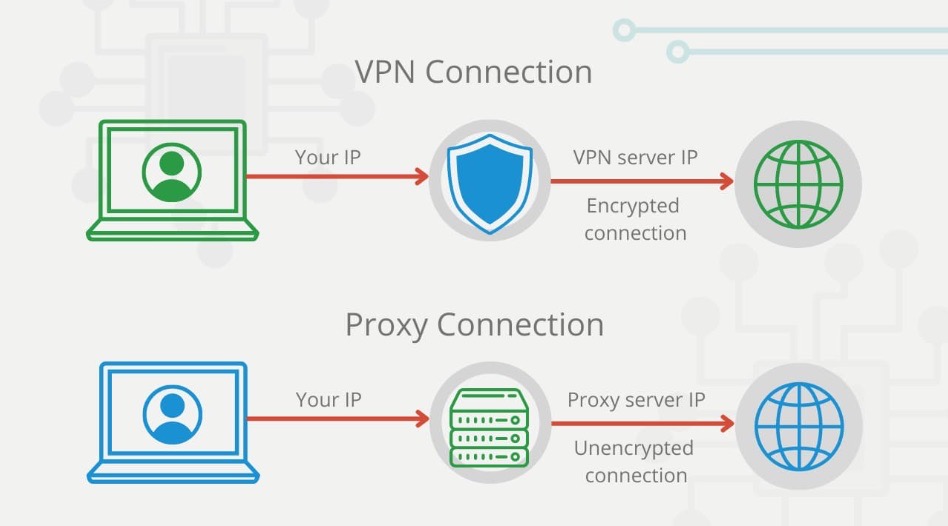
Proxy vs VPN: Which Is Better?
- October 31, 2021
- 7 minutes Read
- VPN Service
Proxy hides your IP address to bypass censorship and is generally faster but doesn’t provide encryption. VPNs are better for privacy and security as they secure your data with strong encryption. Simply put, use a proxy when you need speed and a VPN when you need security.
Proxy is a window where the VPN is the whole house. Proxies can be your temporary solution to bypass internet censorship, but VPNs offer complete security for your digital life. This article will explain the core differences between proxy servers and VPNs. We will also discuss which is better for you and why.
So, let’s explore more on Proxy vs VPN in detail.

Source: What Is My IP Address
Proxy vs VPN: At a Glance
Here’s a glimpse of the main differences between Proxy and VPN.
| Factor | Proxy | VPN |
| Purpose | Hides IP address | Secures data and anonymity |
| Security | Limited (HTTP proxies) | Strong encryption |
| Anonymity | Partial | High |
| Encryption | No | Yes |
| Speed | Faster | Slower (due to encryption) |
| Location Variety | Limited | Wide choice of servers |
| Device Compatibility | Most devices and apps | Most devices and apps |
| Use Cases | Basic web browsing | Privacy, online security |
| Streaming & Torrenting | Often not suitable | Suitable for both |
So, we can see from the table data that proxy and VPNs have significant differences.
What Is a Proxy?
Source: Top10VPN
The proxy acts as a ‘’middleman,” or an intermediary, between your computer or device and the website. It connects you to a proxy server to change your IP address and then routes the connection through that server. This way, you can easily bypass geo-blocks and censorship and access any content anywhere.
What are the Benefits of Proxies?
Here are the benefits of using proxy servers:
- Secures your privacy and security by hiding your IP address.
- Access blocked websites by bypassing internet censorship.
- Experience faster speeds for gaming, streaming, and downloading.
- For more control over your internet usage by filtering unwanted sites.
- Bypass bandwidth and speed throttling by your Internet Service Provider.
What are the Disadvantages of Proxy?
- Hides the IP address but doesn’t encrypt the connection.
- Susceptible to IP banns that can be costly to bypass.
- Risks of IP leak and DNS leak due to low-level encryption.
Now, the question is, how does a proxy work? When you connect to a proxy server, it delivers all connection through that proxy server using its IP address and make it appear that all traffic came from the proxy server, not your computer.
Basically, it’s like a proxy server that takes over your IP address and hides it so the website only sees the proxy server’s IP address. This way, you can easily bypass geo restrictions and unblock geo-blocked content and websites.
For instance, if you are in China/North Korea and want to watch USA Netflix, you only need to connect to the USA Netflix server from Nigeria. It will appear as if you are streaming from the USA, and it will make no difference.
However, using a VPN rather than a proxy is recommended to avoid legal consequences and privacy risks since proxy servers don’t offer enough protection.
What are Types of Proxy?
If your interest is in proxy, it’s worthwhile to know the types of proxy servers you will likely come across.
- SOCKS5: This proxy server is good for video streaming, file sharing, and online games. It’s pretty slower than the next type: HTTP.
- Forward proxy: A forward proxy is like a gateway for the internet. It helps a client or group of clients access the Internet by storing and sending out Internet services like DNS and web pages. This helps the group use less bandwidth.
- Reverse proxy: A reverse proxy is used to control and protect access to a server for load-balancing, authentication, decryption, or caching.
- Transparent proxy: An inline proxy (also known as a transparent proxy) does not mask the IP address of the client and sends connection requests based on the client’s IP address.
- Elite proxy: An elite proxy, also known as a level 1 proxy, provides the highest level of anonymity and does not reveal the user’s IP address.
Each of these types has a different purpose. For example, you go to a shopping mall, airport, or hotel and want to surf the web. But then you realize that you need to access some sites. For instance, you can’t log in to Twitter. That’s because transparent proxy servers block these sites.
Also, parents and employers use it to monitor and control the online activities of their wards and employees, respectively, and restrict access to some websites. Hotels also use it to check the abuse of online activities. To know more about proxy, watch this video on What is a Proxy Server?
What Is a VPN?
Source: Top10VPN
VPN, as the name suggests, stands for a Virtual Private Network. Like a proxy, a VPN server hides your IP location and encrypts your internet connection. A proxy works at the application level; a VPN works at the operating system level.
Simply put, VPN functions as a proxy, but VPN does not only work with single applications or websites; it works with any site or app you browse.
A VPN establishes a secure VPN tunnel to transmit the data securely. VPNs use strong AES 256-bit encryption standards to ensure All your data is unreadable to anyone else, even your Internet Service Provider. VPNs also protect you from malicious websites and protect your personal information from being tracked.
Take Symlex VPN as an example. It secures your internet activities with the strongest encryption standard and protects you from identity leaks, data leaks, and cyber-attacks.
When you need security over speed, a VPN is the best solution. Alternatively, use a proxy if you require a faster connection with little encryption. That’s why proxies are good for gaming, streaming, and P2P (peer-to-peer) file transfers.
To learn more about VPNs, watch this video VPN (Virtual Private Network) Explained
When to Use Proxy?
Use a proxy server if you want faster gaming, streaming, or torrenting connections and when you don’t have strong privacy and security. Proxies are the best solution to unblock geo-restricted content and sites without complexity.
When to Use VPN?
Use a premium VPN service if you want better security, privacy, speed, and stability. VPNs provide you with a 360-degree solution for your digital needs.
VPNs are best used for protecting your online activities from cyber criminals and snoopers. You can browse the web safely and anonymously thanks to its encryption features. Moreover, it provides a device-wide connection for all your apps.
VPN services may cost a lot of money. Still, the value of their protection cannot be compared to the loss you would sustain if hackers stole your private information like banking details, private photos, sensitive documents, etc.
FAQs
Is proxy slower than VPN?
VPNs are slower than proxy servers due to their strong encryption. VPN routes user data through a secure tunnel that is end-to-end encrypted. Because VPNs encrypt data and transmit it over tunnels are generally slower than proxies.
Which VPN is more faster?
Symlex VPN offers a blazing-fast VPN connection with no bandwidth or speed throttling. It has a wide range of 125 servers in 85 locations. Also, you’re backed with industry-leading encryption standard AES-256.
Why is my proxy so slow?
Proxies can slow down if the latency is higher or the server has a bandwidth limitation. High latency makes data transfer comparatively slower. This is common with proxies in foreign countries with poor internet infrastructure.
Final Words
A VPN or proxy is great for keeping your online identity safe, but it’s better than a proxy. A VPN gives you more privacy and security by using secure servers and encrypting your online activities.
A proxy just sends your request through a server that takes over your IP address and looks like you, but it doesn’t do anything else to protect you. On the other hand, VPNs ensure complete privacy and security to ensure everything you do online is secure. Ultimately, VPNs are more effective than proxies.
Bonus: For an insights on choosing the right tool for your needs, read our detailed guide on when to use Smart DNS or VPN. Understanding the specific advantages of each can help you make an informed decision based on your requirements.





